After Parkland: New Student Voices in the Gun Control Debate
By Vicky Camarillo and Maleeha Syed
Reporting Texas
Reporting Texas talked to students, teachers, parents and a school superintendent about how the shooting inspired them to activism and their views on how to reduce gun violence.
‘We just want to feel safe’
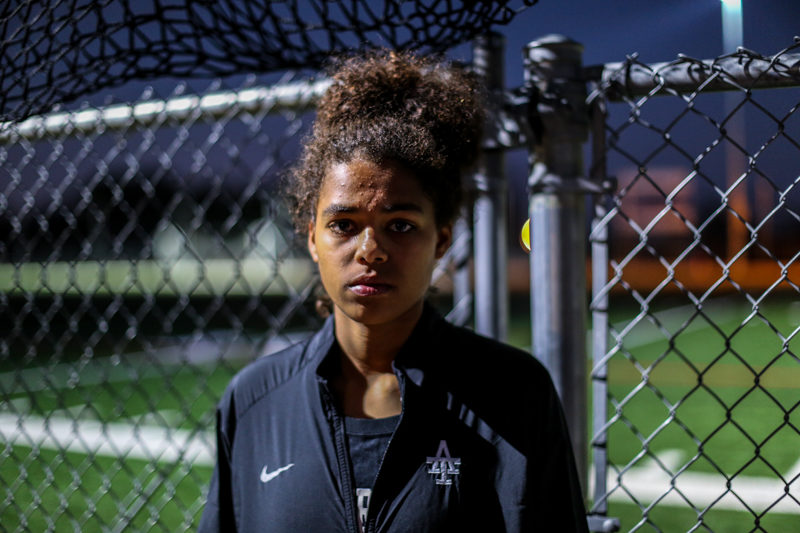
Jami Anderson, a junior at L.C. Anderson High School in Austin, helped organize the student walkout at her school.Adrienne Pond/Reporting Texas
Jami Anderson was angry.
On Feb. 14, a friend messaged her about the shooting underway at Marjory Stoneman Douglas High School in Parkland, Florida, where a former student gunned down 17 people and wounded others.
After Jami, a 17-year-old junior at L.C. Anderson High School in Austin heard about upcoming nationwide school walkouts in support of gun reform, she immediately began to organize one at her school.
On Feb. 21, Jami took to Snapchat and messaged her friends in different social circles to spread the word about the walkout in two days.
On Feb. 23, the school bell rang at 1:20 p.m., signaling the end of the lunch hour at Anderson. But Jami and her friends already had marched out the door – along with 400 to 500 other students there and hundreds more at other Austin-area schools.
Jami said she wasn’t nervous about the walk until that moment. It was, after all, the first protest she’d helped organize, and it was only the second — after the Women’s March in January — she’d participated in.
Outside the school, students observed 17 minutes of silence for the Parkland victims. The protest continued for about two more hours. Their chants resounded: “What do we need? Gun control! When do we need it? Now!”
“At my school, when we try and do something with meaning, a lot of kids are pretty apathetic toward it, as high-schoolers can be,” Jami said. “I wasn’t expecting so many people to be so quickly helping out, eager to do something.”
Jami hopes their message is clear.
“We just want to feel safe,” she said. “I think that there is a majority of high school students who don’t know what steps need to be taken, but there are kids who are informed and do know what needs to happen. And I think the right voices need to be heard.”
Jami supports bans of assault-style weapons and high-capacity magazines. She believes that adding counselors might help some troubled students but would not remove the danger. She thinks that scapegoating mental illness for gun violence is lazy.
And she disagrees with open-carry advocates and President Donald Trump’s proposal to arm teachers to fend off active shooters.
“I think adding more guns to the situation isn’t solving the issue. It’s just adding more violence, because even if you save one life, you’re still going to lose another. … If you arm teachers, then the kids still feel unsafe, and what’s stopping (teachers) from deciding, ‘Why don’t I just protect myself?’”
Jami has not personally heard criticisms of the walkout, but she’s seen conversations on social media get ugly. A man commenting on a video of students protesting “said that it was just any excuse to skip class, basically, like, ‘Look at them, they’re smiling,’” Jami said. “But if I may justify that, I feel anyone would feel extreme joy seeing all their peers so excited and passionate about something so important.”
Jami admires the Parkland survivors who have organized major protests and brought new passion to the conversation about gun control.
“I find it extremely inspiring that young people are doing something,” Jami said. “I think a lot of kids feel that adults just say that this is OK, and we get kind of set in our ways. But a lot of kids are tired of it, and we want better.”
‘This is where it needs to start — with the kids’
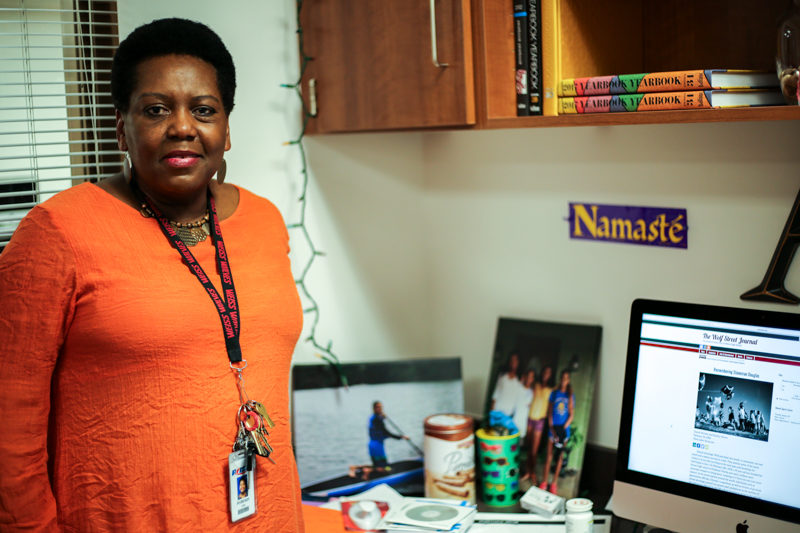
Lesa Anderson, Jami’s mother, a teacher, supported her daughter’s role in organizing a student walkout. Adrienne Pond/Reporting Texas
Lesa Anderson arrived home from work one day to find her daughter deep in thought on the living room sofa with a clipboard in hand. Jami usually holed up in her room to study, so Lesa asked, What are you doing?
Jami admitted that she was organizing a walkout at her school to demand stricter gun laws in the wake of the Parkland shooting.
Lesa, a journalism and yearbook teacher at Weiss High School in Pflugerville, promptly drove back to the campus to retrieve a giant stack of poster boards and a box of markers, and gave them to Jami.
The Andersons are an “activist family,” Lesa said. Their television is always tuned to MSNBC, and Lesa and her husband include their four kids in political conversations.
“She’s in high school, and my husband I both teach high school, and it touches us in so many different ways,” Lesa said. “Something needs to change and something needs to be said. And the people who are going to say that are the people who it’s affecting, and it’s the kids. So when she said that she wanted to start this, I thought, ‘Yes, this is where it needs to start — with the kids.’”
And if the kids decide that the best time to demonstrate is during school hours, so be it, Lesa said.
“I think it’s a part of their education. I had some of my kids here asking, ‘What would happen to us if we did (protest)?’ I said, ‘You’re exercising your First Amendment rights, first of all. And you’re talking about something that is relevant to you, so I think it’s important that you have a say and that you do it when people are here to listen.’”
Lesa is an Army veteran who served in Operation Desert Storm. Despite her experience with weapons, she’s uncomfortable with the idea of being handed a gun to protect her students against a killer.
“Anything can happen in those tense situations, and that’s what scares me,” Lesa said. During her military service, she knew what to do in dangerous situations.
“That was my job,” she said. “My job here is teaching. … If they knew what we did and what we deal with every day as it is, and to add that kind of stress and that responsibility onto us, as well — that alone is ridiculous.”
And, she asks, where will the money come from to buy guns and train teachers on how to respond to active shooters?
“If we would come at this from a different angle, maybe we wouldn’t even have to consider guns,” Lesa said. “Consider making kids feel comfortable coming to school. If everybody feels like this is an inclusive environment, maybe you wouldn’t have those kids who feel like they’re such an outcast and they have to retaliate by shooting up a school.”
To the students, Lesa offers this advice: “Keep that fire burning and growing, because the moment you let that flame die, then the problem is going to continue to grow. Keep making people angry, keep being loud. Keep talking to the people who can make a difference.
Gun rights supporter feels pressured to stay silent
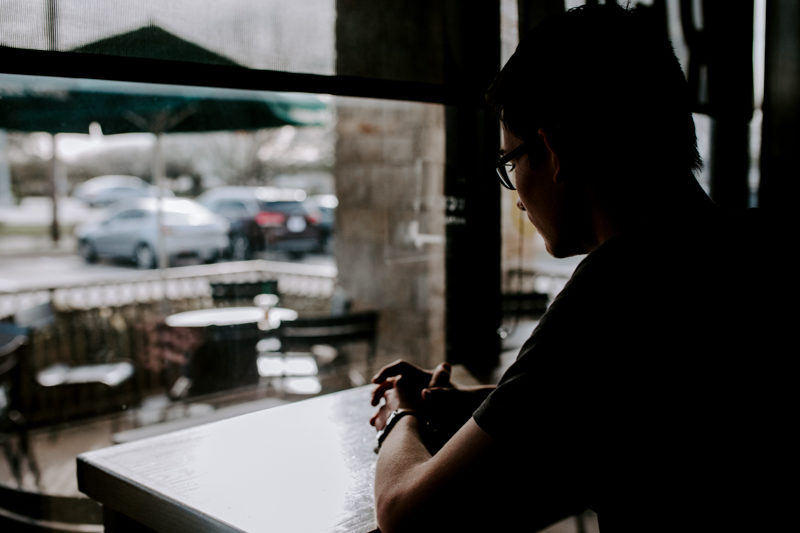
Trey supports gun rights but feels he can’t express his views because the reaction would be hostile. Madison Richards/Reporting Texas
Things have been quiet at Trey’s Austin-area high school — no protests, no walkouts. Yet Trey feels that he’s part of an increasingly silenced group of people who support gun rights.
Trey was angry after hearing about the Parkland shooting. But he was not angry only because students were murdered. Trey, an 18-year-old who belongs to an area rifle club and got a Red Ryder BB gun at age 5, also resents that perpetrators of mass killings use guns. That, Trey said, leads the public to label guns as the problem.
Trey asked that his full name not be used, fearing hostile reactions because of his opinions. Reporting Texas also is not using his father’s last name.
“There are so many guns in the U.S. that are owned by responsible people, but when a disgusting murderer decides to use a gun for a terrible purpose, people think banning guns will solve the problem,” Trey said. “Banning guns would only keep guns out of the hands of good people who could potentially help others in one of these terrible situations.”
Although Trey said many classmates and even some teachers also want guns to remain accessible, he keeps his opinions to himself at school.
One of his classes recently had a conversation about guns, and Trey said that many of his peers appeared to be misinformed about how the AR-15, the semi-automatic rifle used in the Florida shooting, operates. But students who were more familiar with the rifle did not speak up.
“They didn’t want to get singled out by all the people who are against guns. I think they feel scared to do so because of the backlash they will get, especially in a school setting.”
Trey and his father, Dan, said the fault in the Parkland situation lay with law enforcement, including the FBI, which failed to take action after receiving multiple complaints that Cruz had threatened violence, including committing a school shooting.
Trey advocates for more guns in schools. He and Dan say arming teachers is a step in the right direction. They say only teachers who feel comfortable handling weapons — perhaps ex-military or ex-police – should be asked to participate.
Dan supports capital punishment to deter mass shooters, using an extreme example to make his point.
“We’re too nice, if you ask me,” he said. “If we truly went Dark Ages and drew and quartered them, took horses and pulled them all in different directions, the public … would be shocked by that, and that wouldn’t happen the next time, because somebody would go, ‘Well, I might get famous, but I might actually go through horrendous pain.”
Father and son say that some media coverage of mass shootings has encouraged other perpetrators.
“When there is a school shooting, you see that person’s face on any news outlet for the next month or more. What they want is publicity,” Trey said. “They want people to know, ‘This is what I did,’ because they’re sick. If you say, ‘There was a Florida shooting,’ but you don’t identify who it was —”
“Subject zero,” Dan cut in with a laugh. “Here’s a picture of them being pulled apart by horses… ”
“OK, no, maybe not that extreme,” Trey interjected, “ but I just mean, maybe you don’t post their picture and give anyone their name.”
Whatever the solution is, Dan and Trey want their constitutional right to guns protected.
“Guns have become more and more foreign to the average citizen because they don’t use them,” Dan said. “As less and less people are exposed to guns, more and more of them think they’re only for killing. From my perspective, it’s a tool, and I consider it a tool that I’ll always have.”
‘Recognize a movement led by youth’
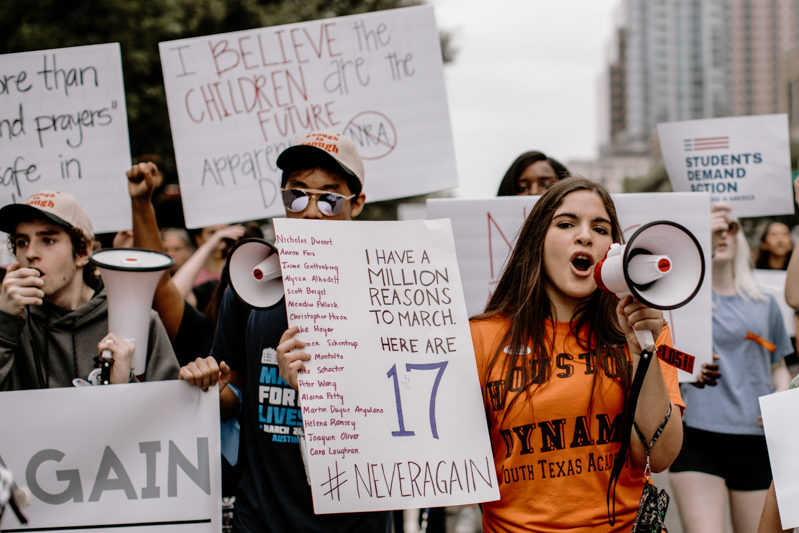
Student protesters attend the recent March For Our Lives from Austin’s City Hall to the state Capitol. Madison Richards/Reporting Texas
Though high school students are spearheading the nationwide movement to push for stricter gun laws, middle school students were the ones making waves in one Austin-area school district.
Four hundred students from Hopewell and Walsh middle schools in the Round Rock Independent School District participated in walkouts in late February; there were no walkouts at district high schools. Superintendent Steve Flores was amazed at the number of students who participated.
“This has been a fascinating time to be an educator, watching the power of the student voice and how so many, in the wake of tragedy, are putting into practice the things they’ve learned in their social studies classes and exercising their rights as Americans to speak up and demand action,” Flores said in an email. “While I have seen students participate in the past, this is one of the largest efforts I’ve seen by a collective student population.”
Flores’ response is in contrast to that of some other superintendents, including those in the Houston-area Needville and Spring districts, who threatened disciplinary action against students who participated in protests.
Flores said faculty and staff in the Round Rock district have prepared for another possible protest on April 20, when a national walkout is planned. The date is the anniversary of the 1999 Columbine High School massacre in Colorado. Administrators will make sure students remain on the school property, but there are no plans to thwart their efforts.
“While I would hope that students would remain in class and not disrupt our learning environment, I also know that this country has a long history, stretching back to our foundation, of protesting injustice, giving our opinions, and holding those who govern responsible,” Flores said. “We cannot in good faith teach civic engagement and then attempt to stomp it out when it occurs in our schools…We should be sensitive to the point in history where we find ourselves and recognize a movement led by youth.”
‘When it said 17 … my jaw dropped ‘
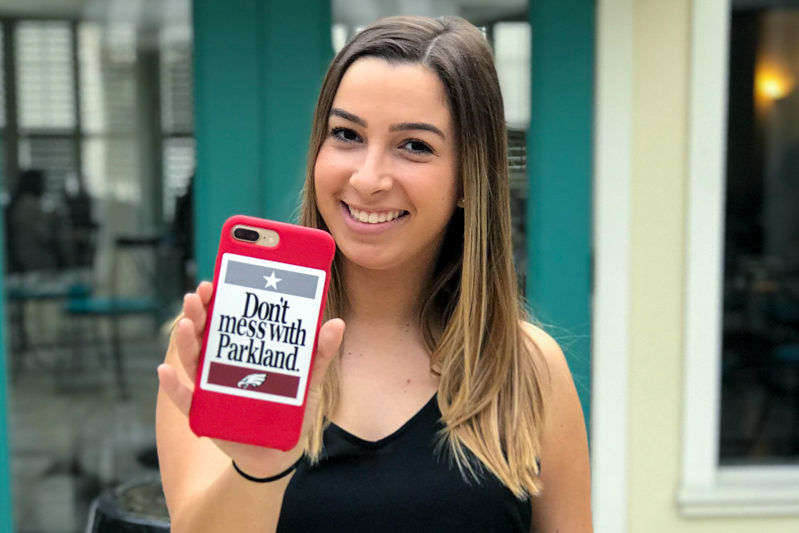
Alexa Wachsman shows a decal on her phone that she created to show support for Parkland survivors. Maleeha Syed/Reporting Texas
As the Parkland shooting unfolded, Alexa Wachsman realized her sister was in danger.
Her sister Julia was inside it when it happened, and Wachsman, who is a graduate of the school, knew other students as well.
“I, like, recognized at least half the people who died,” even if just by name or picture, said Wachsman, a sophomore advertising major at the University of Texas at Austin.
On the afternoon of Feb. 14, Wachsman tried to text her sister after hearing about the shooting at the school. She panicked when the text did not go through, but finally learned that Julia was safe in another building from the one where Cruz had opened fire.
When she finally was able to reach Julia, what she heard was unsettling.
“She was like, ‘I’m fine, but I know something’s going on,’” Wachsman said. “Like, ‘I know we’re on lockdown’… Everything that you would think to hear. Like ‘We’re waiting for SWAT. We’re locked down. We’re behind the door.’”
She turned her attention to the live coverage of the event, trying to understand how something so terrible could happen in her suburban hometown.
“And then later that day, when it said ‘17’… my jaw dropped,” she said, referring to the number of victims.
The tragedy inspired Wachsman to find some way to help the survivors. Within a few days, with the help of a friend, she had created a sticker with a message that played off a Texas motto: “Don’t mess with Parkland.” They’re available in four sizes on redbubble.com.
She said her mom spotted one recently on the bumper of a car at a Parkland gas station.
Regardless of what happens with legislation and policy, Wachsman wants to make sure kids and parents alike feel safe with their schools.
“No one should walk into a school with a gun, and I just don’t think anyone should ever feel unsafe in a school setting,” she said.
‘That was a really hard day for me’
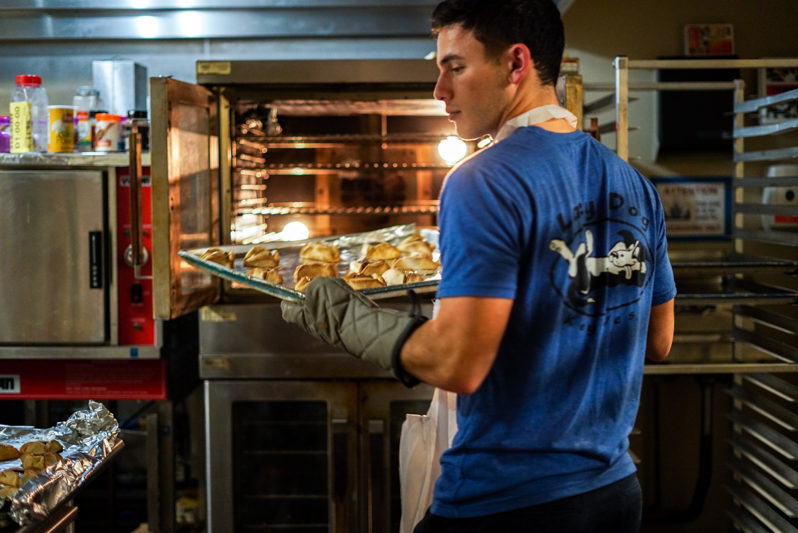
Cole Deutch and his siblings organized bake sale fundraisers after Parkland. Money from his sale at the University of Texas is going to Everytown for Gun Safety. Andrea Garcia/Reporting Texas
UT freshman Cole Deutch didn’t know any of the victims, but the event affected him deeply because it happened close to his Florida neighborhood.
“Shootings… is something that’s always been really hard for me and it’s just hard to, I mean to grow up and see things like that in the news,” Deutch said. “But this one was just even like a little harder just because it was right there, right next to where I live.
“That was a really, really hard day for me.”
“I know people that were in the rooms, in the hallway where people were shot…” Deutch said. “That sticks with someone the rest of their life. That changes people.”
Deutch collaborated with his sisters — one at Yale University and the other at Vanderbilt — to kickstart campus-wide fundraisers. UT’s “Bake Action Against Gun Violence” took place in collaboration with Texas Hillel, a Jewish organization at UT, in early March.
So far, the events have raised $15,578, with donations still coming in, Deutch said. The money from his event will go to Everytown for Gun Safety. The nonprofit advocates for action on issues such as stricter background checks for gun buyers.
Deutch and fellow UT student Alexa Wachsman know and support each other in their respective efforts.
“Everyone else understood something happened but doesn’t understand the town it happened in, really,” Wachsman said. “But he gets it… I’m glad he’s here with me, and I’m not alone.”